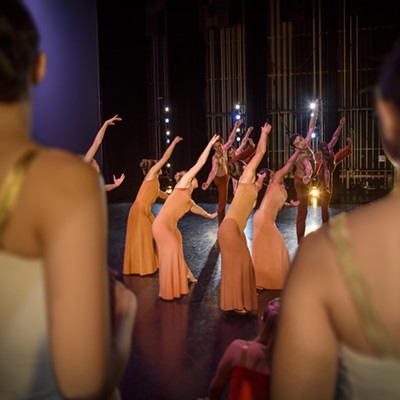There is a phenomenon in the theater world that consists of a play that opened in 1952 and is still running today. It began life as a 30-minute radio broadcast in 1947, a request by Queen Mary for her 80th birthday, and with some revision, it developed into the little play that could.
You may recognize this phenomenon as Agatha Christie's The Mousetrap. It has run at one or another West End theaters in London for over 26,000 performances—and this doesn't count the thousands of productions in other theaters, in this country and abroad.
It doesn't get much of a workout on many public stages these days, though. Michael Wilkinson, who directs the St. Francis Theatre's show, thinks that maybe it's because people are full up of detective stories from the glut that television provides. "But everybody likes a good mystery," he says.
If you have never seen it, you have an opportunity to take a look-see at the St. Francis production that runs through this weekend.
The tale involves all the elements of a good mystery. In the English countryside, a good distance from town, an inn is run by a young-ish married couple. It has now been made even more isolated by the effects of a huge snowstorm. Disparate individuals arrive for a brief stay, and they each have an air of peculiarity about them. When one is murdered, things get tense. There has been another murder close by as well, they hear on the radio, and a man on skis, claiming to be a detective charged with keeping them safe, shows up. Christie then allows human nature to take over as each character must disclose something of who they are, and the nature of those revelations causes them to distrust each other.
Whodunit? And why?
It really is a churning and charming mystery. Christie knows a thing or two about writing in the genre, and she gives things a good twist in the end.
Theaters like St. Francis fall into the category of true community theater, a brand that features the dedicated efforts of our friends and neighbors that may or may not have any theater training or experience—or innate talent, for that matter—but enjoy the opportunity to exercise their creative drive in this manner.
So here's a question. Why do people do it? Why would anyone choose to appear quite nakedly, really, to generally friendly but always a bit judgmental folks, who are not going to get naked along with them? Why would someone commit to eight weeks of abandoning their families to join with, as often as not, strangers with whom they might or might not get along? There's no money in it, and it's a heck of a lot of work.
They are amateurs, in the truest sense of that word. They do it because they love it.
Wilkinson thinks there are as many aspects of this love as there are people participating in the process. Wilkinson, who moved from Tacoma a few years ago, was a high school drama teacher, so he has some experience in the field. For him, this group provides a way for exercising his creative side. Within the context of St. Francis' program, it has another aspect, though, which extends to all the creative programs this United Methodist congregation supports.
Wilkinson explains that the activity "is rooted in the conviction that creativity is an expression of what we call spirit," and so it is actually sort of a connection with the divine. This does not mean that the plays they do are meant to proselytize, are moralistic or attempt to hold forth on any particular issue. There is simply recognition that our urge to create is a dimension inherent in us as human creatures and should be nurtured.
Other folks associated with this production agree that they are attracted by the unique challenges producing a show presents. It's a way of stretching themselves. For Wilkinson, this means trying to identify and use well all the resources available to him. "It results in a type of personal evolution," he says.
Ross Rohde is working with Wilkinson for the sixth time as his stage manager. He owns a healthcare consulting company and had never done any theater work before.
"I really enjoy working with Mike," he says. It's the process of "watching and learning" that intrigues him. "It brings me joy, and maybe it adds some joy to others. I think it also allows us to pause and maybe look at things differently."
Ellie Vought, who plays Mrs. Boyle, has been a part of this group since its inception 30 years ago. For her, participation as an actress is "pure pleasure." She's been a theater fan all her life, but is actually something of "an introvert, and this is a way of pushing [her]self."
She never aspired to act professionally, choosing instead to be a speech pathologist. She is not hesitant to admit that getting "positive feedback" is a real draw to the exercise, but that was certainly not the first thing on her list of why she keeps at it.
For many, if not all, involved in this production, their favorite and probably the most important aspect of their "playing" is the chance to work with others, pulling together toward a specific common goal.
"There's a communal feature that doesn't exist in a nine-to-five job," Wilkinson says. There's almost an instant community, and although individuals "work at different rates," they have to figure out a way to get the job done.
To participate communally in an activity that requires taking risks as well as taking bows is certainly an attractive proposition. There's little wonder why some folks get stage struck, especially when there are plays like The Mousetrap luring you to come out and play.








